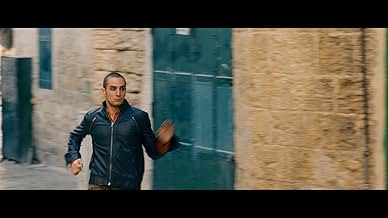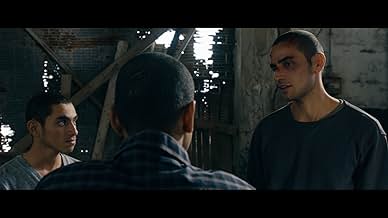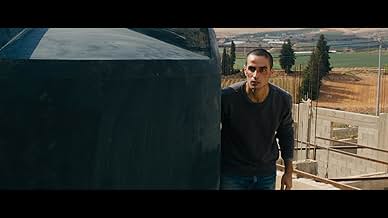AVALIAÇÃO DA IMDb
7,5/10
16 mil
SUA AVALIAÇÃO
Adicionar um enredo no seu idiomaA young Palestinian freedom fighter agrees to work as an informant after he's tricked into an admission of guilt by association in the wake of an Israeli soldier's killing.A young Palestinian freedom fighter agrees to work as an informant after he's tricked into an admission of guilt by association in the wake of an Israeli soldier's killing.A young Palestinian freedom fighter agrees to work as an informant after he's tricked into an admission of guilt by association in the wake of an Israeli soldier's killing.
- Indicado a 1 Oscar
- 13 vitórias e 12 indicações no total
Eyad Hourani
- Tarek
- (as Iyad Hoorani)
Waleed Zuaiter
- Agent Rami
- (as Waleed F. Zuaiter)
Avaliações em destaque
I saw this film at the Ghent (Belgium) film festival 2013. I usually avoid films involving the Israel versus Palestine controversy, but this one looked different while reading the synopsis on the festival website. Central theme is the relationships between people on both sides of the fence, be it family, lovers, friends or schoolmates. The separation fence (border wall) was announced to play a visible role in the plot, a literally high obstacle to be crossed to maintain contact. Also, this film is completely produced at (and financed from) the Palestinian side of the border, something that does not happen very often, awaking interest in spite of the location.
Some negative remarks first. I had problems identifying myself with the main characters and their customs, where flirting, courting, proposing, engaging, and finally getting married seems a convoluted process. At least that is what we think when seeing it through our Western European eyes, where this works very differently. And such things are even more complicated in the middle of the conflict between Palestine and Israel. A very visible role in the plot has a huge wall that we see several times being crossed illegally, as an obstacle to surmount when visiting a woman you love on the other side. After reading the synopsis on the festival website, I deemed this wall a metaphorical role at first, but the underlying political conflict creeps in more and more when getting further in the story.
But there are also many positive things to say about the movie. These film makers get across perfectly, maybe precisely that being their most important achievement, how difficult it is to know for sure in such an environment who can be trusted. Who is on your side, and who is not? Everyone can be a traitor, either because of religious beliefs, bad experiences, blackmail, family secrets, physical pressure, or while relatives or loved ones are held hostage. Given these examples, one may state that not even someone you know from childhood, can be considered full-proof trustworthy material. And what about someone who was imprisoned for a while, but released seemingly before he did the allotted time behind bars? How can you prove you are not a mole, when everyone assumes otherwise??
All in all, as a finished feature film coming from a country we don't recognize as producing films that are worthy to be programmed in a film festival, this one certainly is notable and shows a promising future for these film makers. As of this writing, the film made a good head start for the audience award (2nd place, average score 4.43 out of 5). I deduce that my feeling of remote involvement tells more about me than about the film itself. But anyway, see for yourself as it may provide for some more insight in the underlying political and religious conflicts that seem unsolvable within the foreseeable future.
Some negative remarks first. I had problems identifying myself with the main characters and their customs, where flirting, courting, proposing, engaging, and finally getting married seems a convoluted process. At least that is what we think when seeing it through our Western European eyes, where this works very differently. And such things are even more complicated in the middle of the conflict between Palestine and Israel. A very visible role in the plot has a huge wall that we see several times being crossed illegally, as an obstacle to surmount when visiting a woman you love on the other side. After reading the synopsis on the festival website, I deemed this wall a metaphorical role at first, but the underlying political conflict creeps in more and more when getting further in the story.
But there are also many positive things to say about the movie. These film makers get across perfectly, maybe precisely that being their most important achievement, how difficult it is to know for sure in such an environment who can be trusted. Who is on your side, and who is not? Everyone can be a traitor, either because of religious beliefs, bad experiences, blackmail, family secrets, physical pressure, or while relatives or loved ones are held hostage. Given these examples, one may state that not even someone you know from childhood, can be considered full-proof trustworthy material. And what about someone who was imprisoned for a while, but released seemingly before he did the allotted time behind bars? How can you prove you are not a mole, when everyone assumes otherwise??
All in all, as a finished feature film coming from a country we don't recognize as producing films that are worthy to be programmed in a film festival, this one certainly is notable and shows a promising future for these film makers. As of this writing, the film made a good head start for the audience award (2nd place, average score 4.43 out of 5). I deduce that my feeling of remote involvement tells more about me than about the film itself. But anyway, see for yourself as it may provide for some more insight in the underlying political and religious conflicts that seem unsolvable within the foreseeable future.
If the saga of Omar were a wine, it would have to be described as "Shakespearian, with notes of Dante, Orwell, Golding, and Sartre." Omar is a basically decent, seemingly uncomplicated young bakery worker who is inexorably drawn into the violent political warfare of the West Bank through his love for a girl, his increasingly radicalized circle of friends from childhood, and Israeli injustice. Right up to its unexpected, yet expectable, ending Omar is more victim than protagonist.
Clearly anti-Israeli in tone, the film explores the many reasons why Palestinians maintain an abiding antagonism toward Israel and Israelis. A driving metaphor in the film is the 25 foot high wall that Omar scales regularly to visit Nadia, his intended. Although The Wall was ostensibly designed to separate the Jewish West Bank settlements from Palestinians, it even more effectively separates Palestinian towns, families, and friends from one another--and from their water supplies in many places. To visit a neighboring town along is course has often become virtually impossible for having to detour long distances around the wall's tortuous path and passing through multiple checkpoints. Similarly, the Israeli military and police strive to divide and isolate individuals and groups psychologically just as the wall does physically. It's a classic use of divide-and-conquer strategy, which is one of the film's principal plot threads. Whatever your views of the Israel-Palestine situation, this thoroughly absorbing film will challenge them.
Clearly anti-Israeli in tone, the film explores the many reasons why Palestinians maintain an abiding antagonism toward Israel and Israelis. A driving metaphor in the film is the 25 foot high wall that Omar scales regularly to visit Nadia, his intended. Although The Wall was ostensibly designed to separate the Jewish West Bank settlements from Palestinians, it even more effectively separates Palestinian towns, families, and friends from one another--and from their water supplies in many places. To visit a neighboring town along is course has often become virtually impossible for having to detour long distances around the wall's tortuous path and passing through multiple checkpoints. Similarly, the Israeli military and police strive to divide and isolate individuals and groups psychologically just as the wall does physically. It's a classic use of divide-and-conquer strategy, which is one of the film's principal plot threads. Whatever your views of the Israel-Palestine situation, this thoroughly absorbing film will challenge them.
I watched Omar (2013, directed by Hany Abu-Assad) last night and thought how well Abu-Assad translated a twisting, conniving, chaotic, and disruptive sociopolitical situation to the mis-en-scene and plot points of his film. The story hooked me the moment it began and didn't let go until the end, or perhaps even after it ended. My only complaint came from initially thinking that the plot points seemed forced and overly-contrived. However, once I had time to think and discuss the film with my wife Hannah, I began to see how the story followed the situation in the West Bank. The character's lives are surrounded by conceit and violence. They maneuver through their neighborhoods over walls and through back alleys. This mindset is encapsulated in the story.The acting and cinematography furthers its cause. We are left scratching our heads, but that's what the citizens of the West Bank do year-after-year and the I believe that's the greater point Abu-Assad is trying to make.
"The Israeli-Palestinian conflict has been a tragedy, a clash between one very powerful, very convincing, very painful claim over this land and another no less powerful, no less convincing claim." Amos Oz
It's not easy to fit the story of Romeo and Juliet into a thriller about the Arab-Israeli conflict, but filmmaker Hany Abu-Assad does it with care and believability. So good is he in that balancing act that the notoriously endless national struggle is almost overshadowed by the challenging love Omar (Adam Bakri) has for Nadja (Leem Lubany).
Palestinian Omar, an impassioned freedom fighter in a street gang, becomes ensnared in a convoluted plot as an informant after being tricked into admitting his guilt by association for an Israeli's murder. The major theme is betrayal, found everywhere, informing every life.
Scaling the giant separation wall running through occupied Palestine to visit Nadja, however, is less scary than the torture Israelis inflict on him and the betrayal they demand. How he will free himself when he is caught in a covert action is the thriller part of the story.
Taking the pretzel plot one step further is the trickery of getting Omar to be an informant and the torturous path he must take as the tries to play both sides. Indeed, moments occur when the audience may not be sure which side Omar is on as he fights for his life and his love. No matter, family and nationalism will be major players in his fate.
The film is a powerful screed against the tactics and dominance of Israelis and a simple Shakespearean-like tale of loyalty, love, and jealousy. With the exception of Waleed Zuaiter as Agent Rami, because the actors are new to acting, they bring naturalism to the all-too-real conflict.
The narrow alleys through which Omar races aptly represent the dangerous nature of the Arab-Israeli conflict. Neither Nablus nor Nazareth is filmed in any glamorous way. With the impressive claustrophobic compositions and sets, outside and inside, the director has even more skillfully shown through his star-crossed lovers that this war in not over for soldiers or lovers anytime soon:
"I believe that in the long run, separation between Israel and the Palestinians is the best solution for resolving the Israeli-Palestinian conflict." Yitzhak Rabin
It's not easy to fit the story of Romeo and Juliet into a thriller about the Arab-Israeli conflict, but filmmaker Hany Abu-Assad does it with care and believability. So good is he in that balancing act that the notoriously endless national struggle is almost overshadowed by the challenging love Omar (Adam Bakri) has for Nadja (Leem Lubany).
Palestinian Omar, an impassioned freedom fighter in a street gang, becomes ensnared in a convoluted plot as an informant after being tricked into admitting his guilt by association for an Israeli's murder. The major theme is betrayal, found everywhere, informing every life.
Scaling the giant separation wall running through occupied Palestine to visit Nadja, however, is less scary than the torture Israelis inflict on him and the betrayal they demand. How he will free himself when he is caught in a covert action is the thriller part of the story.
Taking the pretzel plot one step further is the trickery of getting Omar to be an informant and the torturous path he must take as the tries to play both sides. Indeed, moments occur when the audience may not be sure which side Omar is on as he fights for his life and his love. No matter, family and nationalism will be major players in his fate.
The film is a powerful screed against the tactics and dominance of Israelis and a simple Shakespearean-like tale of loyalty, love, and jealousy. With the exception of Waleed Zuaiter as Agent Rami, because the actors are new to acting, they bring naturalism to the all-too-real conflict.
The narrow alleys through which Omar races aptly represent the dangerous nature of the Arab-Israeli conflict. Neither Nablus nor Nazareth is filmed in any glamorous way. With the impressive claustrophobic compositions and sets, outside and inside, the director has even more skillfully shown through his star-crossed lovers that this war in not over for soldiers or lovers anytime soon:
"I believe that in the long run, separation between Israel and the Palestinians is the best solution for resolving the Israeli-Palestinian conflict." Yitzhak Rabin
In places like the West Bank truth is the first casualty. This fictional tale takes real life tensions and offers very believable characters to make that point.
The 3 friends (Omar, Tarek & Amjad) plus the sister Nadia are constantly kept off balance by the political tensions that come from living in Palestine.
The director manages to add just enough warmth and naturalness to the various story loops to keep us on side with the lead characters.
The Israeli lead protagonist (Rami) has clearly read Machievelli's the Prince. He uses half truth, insinuation and educated guesses to rattle Omar and his friends.
Just when you think you know what is going to happen it all changes. This is a great movie. I saw it at a film festival but I hope it goes on to wider release.
The 3 friends (Omar, Tarek & Amjad) plus the sister Nadia are constantly kept off balance by the political tensions that come from living in Palestine.
The director manages to add just enough warmth and naturalness to the various story loops to keep us on side with the lead characters.
The Israeli lead protagonist (Rami) has clearly read Machievelli's the Prince. He uses half truth, insinuation and educated guesses to rattle Omar and his friends.
Just when you think you know what is going to happen it all changes. This is a great movie. I saw it at a film festival but I hope it goes on to wider release.
Você sabia?
- CuriosidadesOfficial submission of Palestine to the Oscars 2014 best foreign language film category.
- Erros de gravaçãoTodas as entradas contêm spoilers
- Cenas durante ou pós-créditosThe credits roll in complete silence without any music.
- ConexõesFeatured in At the Movies: Cannes Film Festival 2013 (2013)
Principais escolhas
Faça login para avaliar e ver a lista de recomendações personalizadas
- How long is Omar?Fornecido pela Alexa
Detalhes
- Data de lançamento
- País de origem
- Centrais de atendimento oficiais
- Idiomas
- Também conhecido como
- Ömer
- Locações de filme
- Empresa de produção
- Consulte mais créditos da empresa na IMDbPro
Bilheteria
- Orçamento
- US$ 2.100.000 (estimativa)
- Faturamento bruto nos EUA e Canadá
- US$ 356.000
- Fim de semana de estreia nos EUA e Canadá
- US$ 157.000
- 23 de fev. de 2014
- Faturamento bruto mundial
- US$ 614.444
- Tempo de duração1 hora 38 minutos
- Cor
- Mixagem de som
- Proporção
- 2.35 : 1
Contribua para esta página
Sugerir uma alteração ou adicionar conteúdo ausente


























